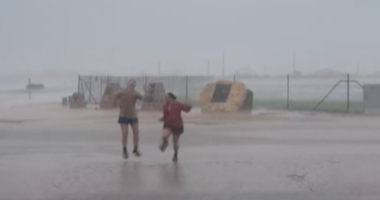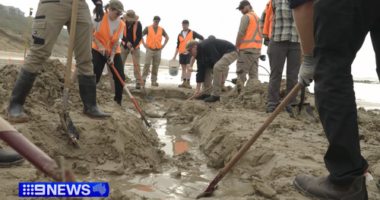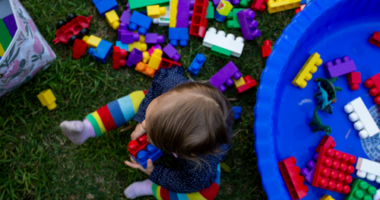Share this @internewscast.com
The boys had been participating in remote learning from grade one in Melbourne for about two years, leading Valentine to opt for homeschooling.

Clarissa helps Miles with some schoolwork. Credit: SBS
Valentine says she was also motivated by the vaccine mandate imposed in schools.
“I had relatives working at a school [on the Sunshine Coast] where I intended to enroll my children, but they lost their jobs due to not receiving the vaccine,” Valentine recounts.
It just didn’t feel right to then put my kids in that system.
“While nothing is flawless, including the education system, distancing yourself from it can provide a broader perspective on the actual situation,” she states.
Growing trend towards homeschooling
It shows that Queensland has experienced the biggest rise in homeschooling across all states and territories, increasing by 163 per cent since 2020.

Queensland has experienced the most significant increase of homeschooling students, rising by 163% from 2020. Credit: Supplied/Vivienne Fox
Dr Rebecca English, a senior lecturer in education at Queensland University of Technology, says while homeschooling rates had been slowly increasing prior to COVID-19, numbers ballooned at the onset of the pandemic.
“And they were seeing how that neurodiverse person, or that child who had reported they were bullied, was coping with that learning environment”.
Why has Queensland seen the biggest growth?
“I think [that’s possible] when you look at the Brisbane area and the Sunshine Coast area and you look at other elements of maybe not going along with [the] mainstream, [and] higher rates of non-vaccination in [and] around Brisbane and the Sunshine Coast.”

Dr Rebecca English is a senior lecturer in education at Queensland University of Technology. Credit: QUT/Anthony Weate
Parents also attribute the popularity of homeschooling to its vibrant community mindset, particularly in the Sunshine Coast, which Valentine says encourages families to consider alternative education.
“There are so many things on the Sunshine Coast in particular that you could participate in that you could be busy all day, every day”.
The ‘school refusal’ cohort
“The increase in that 85 per cent [is] these accidental homeschoolers — they didn’t set out to homeschool [but] they find that this is the only choice. That is where the real research interest lies,” she says.

Eight-year-old Ben started homeschooling two years ago after experiencing school refusal. Credit: Danika / Supplied
After a year of trying mainstream schooling, Sunshine Coast residents Danika and Joel resorted to homeschooling their eight-year-old son Ben, after his school refusal and anxiety reached a tipping point.
“And then we peeled back the layers, and the neurodiverse aspect in a mainstream school was quite overwhelming.”

Danika, Ben and Milly learning together at home. Credit: Supplied
Ben has since been diagnosed with ADHD, which Danika says contributed to his school refusal.
“We thought: ‘What’s happening in the school grounds that’s making him feel this way?’ But there [were] no particular incidents. He just didn’t feel safe and secure mentally”.
Shortcomings of mainstream schooling
“I think there’s a change in our society around questioning traditional schooling methods,” Twyford says.
I’ve certainly seen increases in adolescent mental health and ‘school can’t’ and ‘school refusal’ movements.
“I think that’s something that we really need to look at: How can we better meet the needs of particularly neurodiverse young people in our classrooms?”
Calls for more regulation in home schooling
The legislation does maintain a reform to change the eligibility age range for homeschool students, lifting the cut-off age from 17 to 18, which is a move that has been advocated for by homeschooling parents.

Patricia Fitzgerald and Amanda Bartle started the Free2Homeschool campaign seeking to protect caregivers’ ability to meet the specific education needs of homeschooled students. Credit: Patricia Fitzgerald
Queensland’s Family and Child Commission conducted a report last year into Queensland’s home education system, in response to concerns raised by the Child Death Review Board in their 2022-2023 report.
“It’s a parent’s right to choose the type of education that best suits their family, but safety must always be the priority,” Langbroek says.
Changing lifestyles and greater flexibility
One of the key changes could be a more tailored approach to education, says English.
Homeschooling is much more child-centred and I would expect to see that schools will adopt more of that child-centred learning.
“It allows me to spend quality time with my kids every day, and I’ve really seen the benefits of that in terms of our closeness and our relationship, [which] is beautiful,” she says.

Valentine says there are so many varying learning opportunities afforded by the flexibility of homeschooling. Credit: Supplied
She says her family feels part of a “bigger community”.













